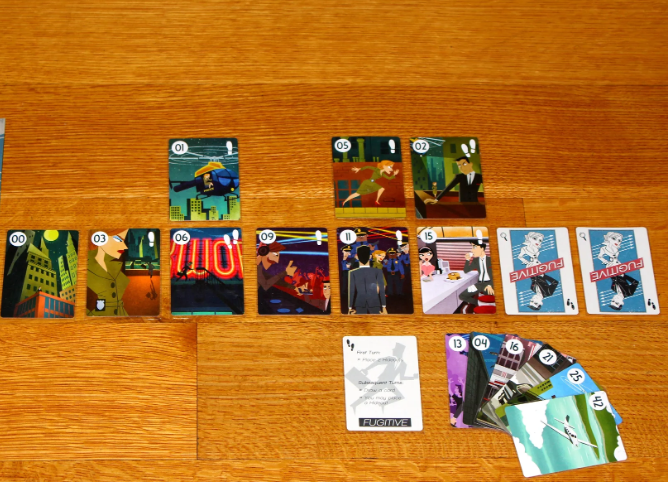The Fugitive Card Game, an enthralling duel of wits and strategy, transports players into a world of fugitives and marshals. The game simulates a pursuit, where one player embodies the fugitive, desperately attempting to escape, while the other takes on the relentless role of the marshal, diligently chasing down their elusive target. In this comprehensive guide, we will thoroughly immerse ourselves in the world of the Fugitive Card Game. From understanding the basics to delving into intricate strategies and sharing invaluable tips, this guide aims to equip you to emerge as a master of this suspenseful and strategic card game.

Understanding the Basics
Before delving into advanced strategies, it’s essential to cement a solid understanding of the game’s fundamentals. The Fugitive Card Game is orchestrated using a dedicated deck of cards, each bearing a unique number and special abilities. The primary objective entails the fugitive’s race towards the highest-numbered card—the exit card—while the marshal endeavors to decipher the fugitive’s trail and make an arrest before the escape is successfully executed.
Rules of Engagement
Setting Up the Game
The game initiates with the shuffling of the deck, followed by the creation of a sequence of numbered cards placed face-down, essentially forming the path from the hideout to the exit. Each player is then allocated their respective role cards, designating one as the fugitive and the other as the marshal, setting the stage for the ensuing chase.
Fugitive’s Actions
The fugitive strategically plays cards face-down, symbolizing their movements along the path, often leading the marshal into a maze of possibilities. Special abilities embedded within certain cards can be employed by the fugitive, adding layers of complexity and surprise to their moves.
Marshal’s Role
The marshal’s task involves the discernment of the fugitive’s actions, accurately placing suspicion cards on the path to predict their movements. Careful consideration of the fugitive’s tactics, coupled with timely revelations of suspicion cards, can potentially lead to a successful capture.
Strategic Approaches
Mastering the Fugitive Card Game necessitates a profound understanding of its rules, coupled with the ability to devise effective and flexible strategies to outwit your opponent:
Fugitive’s Evasion Tactics
The fugitive should strategically utilize special ability cards, leveraging them to create confusion and misdirect the marshal, amplifying the challenge of pursuit. Avoiding predictable moves and maintaining an element of surprise can throw the marshal off course, rendering their deductions less accurate.
Marshal’s Deduction Skills
The marshal should employ acute deduction skills, analyzing the fugitive’s movements and narrowing down their potential locations along the path.
Adroit placement of suspicion cards based on deduction and intuition can corner the fugitive, leading to a successful capture.
Bluffing and Misdirection
Both players can integrate bluffing techniques into their gameplay, attempting to deceive and outmaneuver their opponent.The fugitive can feign movement in one direction while covertly heading another way, while the marshal can strategically place suspicion cards to sow doubt and confusion.
Tips for Success
Stay Mindful of Card Counts:
Vigilance in Tracking Cards
Pay close attention to the cards in play and those remaining in the deck. This careful tracking provides valuable insights for both the fugitive and the marshal, aiding in strategic decision-making.
Strategic Utilization of Knowledge
Use your knowledge of card counts to your advantage. For the fugitive, it helps in planning elusive moves, and for the marshal, it aids in narrowing down potential locations of the fugitive.
Adapt to the Game’s Progress
Real-time Strategy Adjustments
Flexibility in strategies is key to success. Continuously evaluate the game’s progress and be ready to alter your approach based on the evolving situation and your opponent’s moves.
Dynamic Decision-making
Embrace adaptability to stay ahead in the game. Your initial plan might require adjustments as the game unfolds, ensuring you’re always a step ahead of your opponent.
Mind Games and Psychology
Understanding Your Opponent
The Fugitive Card Game is not just about the cards; it often involves psychological elements. Understand your opponent’s playing style, tendencies, and preferences.
Employing Psychological Tactics
Use psychological tactics to influence your opponent’s decisions. Strategic misinformation, bluffing, and creating uncertainty can significantly impact the outcome of the game, making your approach as crucial as the cards themselves.
Mind Games and Psychology
The Fugitive Card Game is more than just a sequence of strategic moves. It’s a mental chess match infused with psychological intricacies. Understanding your opponent’s playing style and the art of mind games can be as pivotal as the cards themselves. In this thrilling pursuit, every move is a potential mind game, a subtle manipulation, or a careful observation. The success of a fugitive or a marshal often hinges not only on the cards they hold but on their ability to read their opponent and play the game within the game.
Final Thougths
As you delve into the depths of the Fugitive Card Game, mastering its rules, refining your strategies, and embracing the psychological dimensions of the gameplay, you’ll inevitably transform into a formidable player within this captivating universe. With each game, you’ll polish your skills, elevating each pursuit to a thrilling and intense adventure, leaving both fugitives and marshals yearning for more.











